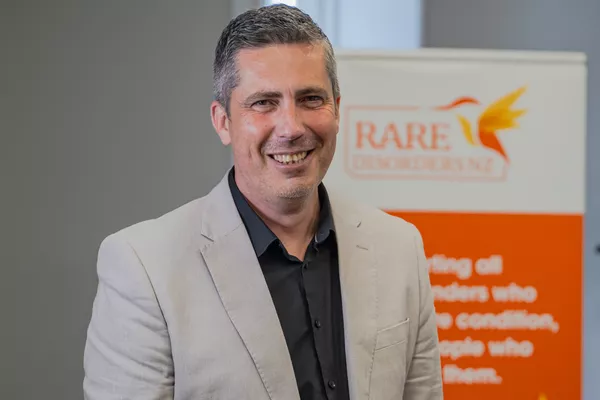Rare Disorders NZ Chair forced to become another medical refugee
25 Sep 2025
The Chair of Rare Disorders NZ’s board is stepping down from his role to move his family to Australia to access life-saving treatment not funded in New Zealand.
James McGoram lives with Fabry disease, a rare genetic disorder that affects the body’s ability to break down glycolipids due to a missing enzyme. It is a degenerative disorder that affects a number of organs in the body and can lead to premature death.
While there is no cure, there are treatments available in many OECD countries, including Australia since 2004. These treatments can slow degeneration from the disease and greatly improve the quality of life for sufferers. No treatments for Fabry disease are available in New Zealand.
“It has been a very tough decision for my family to uproot ourselves from our community, and to leave our home, our friends and our family behind, but as time goes by my situation is getting more precarious,” says James.
“When my symptoms first began impacting my life, I decided to volunteer for Rare Disorders NZ because I could see that rare disorders faced systemic challenges and needed more attention. I’ve fought hard for the rare community, and it frustrates me that my illness, and the lack of treatment, mean that I am compelled to leave to save my life.”
Four treatment options for Fabry disease have been under assessment at Pharmac; one from as far back as 2006. Thanks to ongoing advocacy from specialists and from the Fabry community themselves, three are now finally sitting on Pharmac’s Options for Investment list – Pharmac’s approved list of medicines waiting for funding.
Pharmac’s Rare Disorders Advisory Committee gave one of the treatments a high-priority ranking in its clinical advice.
“To those waiting for treatment, Pharmac’s assessment processes seem more heavily geared towards saving money than saving lives due to their fixed budget, and this puts high-cost, low-volume medicines such as those for rare disorders at a disadvantage,” says James.
“Pharmac is severely under-funded. If the wider economic and societal impacts of funding a medicine were taken into consideration, the Government would undoubtedly see that there would be huge cross-sector savings.”
“Currently, even though treatment would add decades to my life and help me avoid the worst effects of the disease it is not enough to sway funding calculations in my favour.”
James has been on the board of Rare Disorders NZ for five years and in that time he has strongly advocated for equitable healthcare for people living with rare disorders in New Zealand.
“There are many systemic inequities for people living with rare disorders in New Zealand. We are the people who don’t quite fit, and rather than the system making room for us, we are all too often thrown in the ‘too hard basket’,” says James.
“It has taken years of advocacy, but the rare community has managed to get the Ministry of Health to develop New Zealand’s first Rare Disorders Strategy. I am immensely proud of that, but there is still work to be done to see it implemented.”
“I hope that New Zealand can look forward to a future where people living with rare disorders feel equally valued and get the support they deserve. Nobody chooses to have a rare disorder, but everybody deserves the same level of care.”
James McGoram will be stepping down from his role of Chair of Rare Disorders NZ at the upcoming AGM on 25th September. Ariane Tuapola will be stepping in to the role of Chair.
TVNZ covered James' story, which can be found here.


